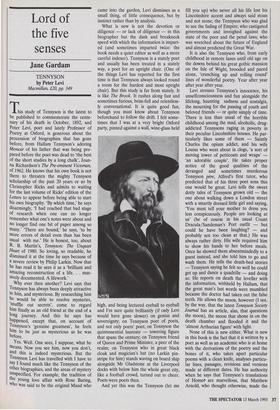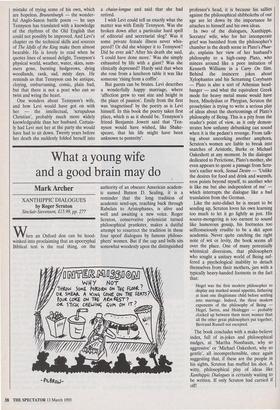Lord of the five senses
Jane Gardam
TENNYSON by Peter Levi Macmillan, £20, pp. 349 his study of Tennyson is the latest to
be published to commemorate the cente- nary of his death in October, 1892, and Peter Levi, poet and lately Professor of Poetry at Oxford, is generous about the procession of biographies that has gone before, from Hallam Tennyson's adoring Memoir of his father that was being pre- pared before the poet was dead to 'the best of the short studies by a long chalk', Joan- na Richardson's The Pre-eminent Victorian, of 1962. He knows that his own book is not there to threaten the mighty Tennyson scholarship of the past 20 years or so by Christopher Ricks and admits to waiting for the last volume of Ricks' edition of the Letters to appear before being able to start his own biography. 'By which time,' he says disarmingly, 'I had reached that bad stage of research when one can no longer remember what one's notes were about and no longer find one bit of paper among so many.' There are bound,' he says, 'to be more errors of detail even than has been usual with me.' He is honest, too, about R. B. Martin's, Tennyson: The Unquiet Heart of 1980. So loving, so readable, he dismissed it at the time he says because of a severe review by Philip Larkin. Now that he has read it he sees it as a 'brilliant and amazing reconstruction of a life. . . mas- sively documented. A lifework.'
Why ever then another? Levi says that Tennyson has always been deeply attractive to him, and mysterious. By researching him he would be able to resolve mysteries, snuffle out secrets', come to regard him finally as an old friend at the end of a long journey. And this he says has happened, except that, on account of Tennyson's 'genuine greatness', he feels him to be just as mysterious as he was before.
Yes. Well. One sees, I suppose, what he Means. Now you see him, now you don't, and this is indeed mysterious. But the Tennyson Levi has travelled with I have to say I found much like the Tennyson of the other biographies, and the areas of mystery unspecified. For example, the tradition of the young love affair with Rose Baring, who was said to be the original Maud who came into the garden, Levi dismisses as a small thing, of little consequence, but by instinct rather than by analysis.
What is new is not the devotion or diligence — or lack of diligence — in this biographer but the dash and breakneck speed with which the information is impart- ed (and sometimes imparted twice: the book needs a quiet editor as well as a more careful indexer). Tennyson is a stately poet and usually has been treated in a stately way, a poet for an upright chair. (One of the things Levi has reported for the first time is that Tennyson always looked round a room for the hardest and most upright chair). But this study is far from stately. It is like The Brook. It rushes along fast and sometimes furious, brim-full and relentless- ly conversational. It is quite good fun, though you must know about Tennyson beforehand to follow the drift. I felt some- times that I was at a very bright Oxford party, pinned against a wall, wine-glass held
high, and being lectured eyeball to eyeball and I'm sure quite brilliantly (if only Levi would have gone slower) on genius and sovereignty; on Tennyson poet of poets, and not only poets' poet; on Tennyson the quintessential laureate — towering figure that spans the century; on Tennyson friend of Queen and Prime Minister, a peer of the realm; on Tennyson who in great black cloak and magician's hat (no Larkin pin- stripe for him) stands waving on board ship alongside Mr Gladstone at the Liverpool docks with below him the whole great city, like a football crowd, turned out to cheer. Poets were poets then.
And yet this was the Tennyson (let me fill you up) who never all his life lost his Lincolnshire accent and always said stoan and not stone; the Tennyson who was glad to see the fading of Empire; who castigated governments and inveighed against the state of the poor and the penal laws; who was wretched about the future of England and almost predicted the Great War.
It is also the Tennyson who, from early childhood in remote lanes until old age on the downs behind his great gothic mansion on the Isle of Wight, brooded and paced alone, 'crunching up and rolling round' lines of wonderful poetry. Year after year after year after year.
Levi stresses Tennyson's innocence, his unselfconsciousness and fun alongside the lifelong, haunting sadness and nostalgia, the mourning for the passing of youth and beloved friends — or quite simply of time. There is less than usual of the horrible childhood among the mad, alcoholic, drug- addicted Tennysons raging in poverty in their peculiar Lincolnshire houses. He par- ticularly likes some of them — Saintly Charles the opium addict, and his wife Louisa who went about in clogs, 'a sort of moving tower of petticoats and wraps' 'an adorable couple'. He takes proper notice of the good qualities of the deranged and sometimes murderous Tennyson pere, Alfred's first tutor, who predicted that of his three poet sons this one would be great. Levi tells the sweet dotty tales of Tennyson grown old — the one about walking down a London street with a smartly dressed little girl and saying, `You must tell your mother to dress you less conspicuously. People are looking at us' (he of course in his usual Count Dracula /Sandeman's Port outfit — but could he have been laughing? — and probably not too clean at that.) He was always rather dirty. His wife required him to show his hands to her before meals. Once he showed them absentmindedly to a guest instead, and she told him to go and wash them. He tells the death-bed stories — Tennyson saying he felt so well he could get up and dance a quadrille — and doing so. He reports on death the leveller with the information, withheld by Hallam, that the great man's last words were mumbled because the doctor had taken out the false teeth. He allows the moon, however (I see, by the way, that the latest Tennyson Society Journal has an article, alas, that questions the moon), the moon that shone in on the death chamber and flooded it and the `almost Arthurian figure' with light.
None of this is new either. What is new in this book is the fact that it is written by a poet as well as an academic who is at home with the derivations of the poetry and the bones of it, who takes apart particular poems with a clean knife, analyses particu- lar lines, passages, revisions and versions made at different dates. He has authority when he says that Tennyson's translations of Homer are marvellous, that Matthew Arnold, who thought otherwise, made the
mistake of trying some of his own, which are hopeless. Brunenburgh — the wonder- ful Anglo-Saxon battle poem — he says Tennyson has translated with a knowledge of the rhythms of the Old English that could not possibly be improved. And Levi's chapter on the technical skills and sources of The Idylls of the King make them almost bearable. He is lovely to read when he quotes lines of sensual delight, Tennyson's physical world, weather, water, skies, sum- mers gone, bursting hedgerows, dying woodlands, rank, sad, misty days. He reminds us that Tennyson can be antique, cloying, embarrassing, comic, plain bad, but that there is not a poet who can so twist and wring the heart.
One wonders about Tennyson's wife, and how Levi would have got on with her — the intellectual, 'scrupulous Christian', probably much more widely knowledgeable than her husband. Certain- ly had Levi met her at the party she would have had to sit down. Twenty years before her death she suddenly folded herself into
a chaise-longue and said that she had retired.
I wish Levi could tell us exactly what the matter was with Emily Tennyson. Was she broken down after a particular hard spell of editorial and secretarial slog? Was it some private female illness never whis- pered? Or did she whisper it to Tennyson? Did he ever ask? After his death she said, `I could have done more.' Was she simply exhausted by life with a giant? Was she clinically depressed? Hardy said that when she rose from a luncheon table it was like someone 'rising from a coffin'.
But guests can be brutes. Levi describes a wonderfully happy marriage, where `affection grew to vast size and height in the place of passion'. Emily from the first was 'magnetised' by the poetry as is Levi himself. In this book the poetry takes first place, which is as it should be. Tennyson's friend Benjamin Jowett said that 'Ten- nyson would have wished, like Shake- speare, that his life might have been unknown to posterity'.



























































 Previous page
Previous page